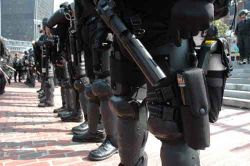Halifax Media Co-op
News from Nova Scotia's Grassroots
Violence(s): The story being written for the G20
The narrative is set. The stories have been written and the talking points crafted accordingly. Violent protesters, probably masked up, caused a ruckus in downtown Toronto. The mainstream media will focus on the sensational images. Other groups organizing the protests will complain about how violence hurts the movement and detracts from the issues. Some people who engage in violent/confrontational tactics will respond that their tactics will garner more coverage, it will inspire others and it is an effective form of resistance.
The G20 will thrust the debate about violence into the spotlight. Is it effective? Can it be regulated? Should it be disavowed? What is violent? There is an infinite amount of ways one could dissect the discussion on violence. Here is are just a few:
Who is violent?
There will be over 10,000 police officers in downtown Toronto. They have the full force of the law and state behind them. They will be armed with tear gas, pepper spray, guns, rifles, paint guns, horses, dogs, body armour, shields, clubs, sound cannons and god knows what else. They will shutdown downtown. They have erected a 10-foot unscaleable fence. In the security zone they have ripped up trees, created a 5-layer security ring, banned street vendors, patios and parked cars. They have even banned kite flying in Toronto. In short they have used every opportunity to blanket Toronto in a climate of fear. It is a 1 billion dollar terrorist operation.
They are facing demonstrators from labour, peace, environmental, migrant justice, anti-poverty, feminists, LGBT, and other community organizations and NGO’s. Most of these groups will be non-violent. Some protesters will engage in forms of non-violent civil disobedience. An even smaller amount will use violent tactics. They will wear masks, push police, resist arrest, throw objects at the police and have homemade shields.
There is no comparison.
Does violence hurt the movement?
The answer is tricky. Some violence can be counter-productive, some not. Pushing back. It’s violent but useful. It can keep people safe and strengthen people’s sense of power. The Black Bloc tactics, which are violent, hurt the movement. Not because they are violent, but because they are tired tactics. When used properly blocking-up can keep people safe. As it stands now though, the bloc has become a ritualized and ineffective tactic. It is impotent violence.
Nonviolence?
That being said we should not, as Maude Barlow suggests, “commit (ourselves) to principles of nonviolent civil disobedience and agree not to deface property, engage in any form of aggressive behavior toward the police…or hide faces behind masks.” The idea of rejecting violence is counterproductive. It splits movements and takes away a valuable tool of self-protection. Nonviolence is a useful tactic. However universalizing that tactic both rejects a long legacy of struggle and it fails to understand the stakes of the struggle.
Violence?
If we are serious about overthrowing capitalism we must recognize that it will be a violent undertaking and brutal subtraction. It is a violent prospect. The problem, as Slavoj Zizek points out, is that if you want a radical upheaval of the basic social relation we have not been violent enough. We must not be so naïve to think nonviolence will morally disable a violent system.
When to use it?
Some groups will call for no masks or non-violent tactics at their demos. These are, more often than not, reasonable requests. Certain demos (i.e. rights of non-status people) violent tactics can be counterproductive. Violence at demos can put people at risk and define the experience for everyone. Violence is a tactic and those who engage in it should recognize its impacts on others around them.
Denouncing?
In Toronto, the media and the security services are whipping up fear. They are trying to provoke splits among violent and nonviolent protesters. We have to have a culture where criticism breeds strength instead of division. Don’t stoke the fear.
The sum up:
. Don’t compare violences.
2. Don’t denounce violence in and of itself.
3. Be aware of others.
4. Don’t worship petty acts of violence.
5. We need to be more violent in a different way.
Dave Bush is a Halifax activist in Toronto for the G20. He will be blogging on the Halifax Media Co-op site throughout the convergence.
http://hammerhearts.wordpress.com/2010/06/18/violences-the-story-being-w...
The site for the Halifax local of The Media Co-op has been archived and will no longer be updated. Please visit the main Media Co-op website to learn more about the organization.



